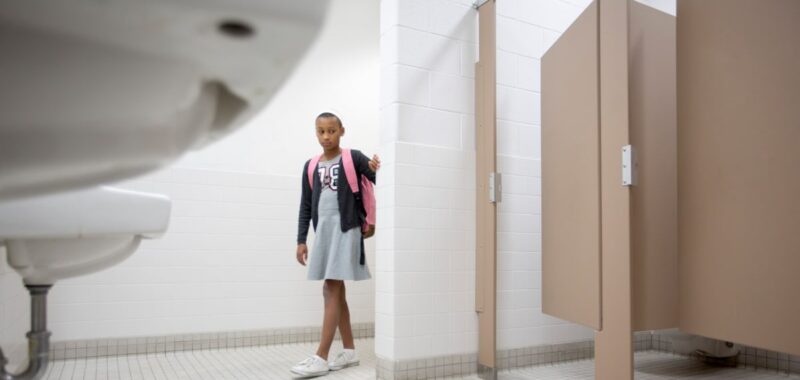Pooping in public is always an experience fraught with anxiety. Whether you’re at a friend’s house, in the Target bathroom, or a Barnes & Noble (why is it always a Barnes & Noble), there’s something slightly terrifying about needing to poop. You’re worried about other people hearing you poop, smelling your poop, catching your eye in the mirror above the sink and knowing you’re the one who POOPED. It’s too much. So it’s no wonder our kids have the same anxious tendencies, especially kids who are scared to poop at school.
Why won’t my kid poop at school?
If your kid’s holding in their poop all school day, it’s important to figure out why.
Sara Siddiqui, MD, FAAP, assistant clinical professor at Hassenfeld Children’s Hospital, tells Scary Mommy that a child being concerned about their bowel habits is pretty normal. “If a child has an experience where they were not comfortable, this may lead to stool-holding during the day away from home. Sometimes, it can be something as simple as using a different bathroom or ensuring that when a child has to use the restroom, they are allowed to do so in a quick manner. Other times, it may be a bit more complex,” she says.
So step one: Talk to your kiddo. If they struggle with pooping, especially toddlers and preschoolers, they may be holding onto their bowel movement because they’re afraid it will hurt. This, of course, is a hard cycle to get into because the longer they refuse to poop, the worse it will be when they finally do.
“As a pediatrician, I have written notes on occasion to allow children to use a different space or be allowed to use the bathroom when needed,” Siddiqui says. You should also make sure your child’s having a well-balanced diet with plenty of fruits, fiber, and water. If your child’s having a lot of bowel movement issues and it’s affecting how they go at school, it might be time to speak with your child’s pediatrician.
What if your kid’s just holding their poop because they’d rather poop at home?
Maybe your kid doesn’t have any tummy or pooping issues, and they’re just like, “Yeah, no” to using a public bathroom. Understandable. But could that cause potential issues? “Children — and adults — should have a bowel movement at least once a day,” Siddiqui says. When and how that happens doesn’t necessarily matter that much. But if you notice your child’s struggling to go once they’re home or having hard, painful bowel movements, it may be time to intervene.
Siddiqui recommends checking the “Bristol stool chart” to determine if your child is constipated or having loose stools. She also recommends teaching your kids the importance of using the restroom as soon as they need to so they can avoid stomach pain, painful bowel movements, and/or cramping.
“These pains can get worse as stool accumulates in the intestines. Another issue with holding stool for prolonged periods of time is the rectum may become more dilated, which can cause larger, more painful stooling process. Medications like stool softeners can assist but must be used under the guidance of a pediatrician or health care provider.”
If you’re attempting any kind of intervention on your child to help them poop, be sure to talk to their doctor.
What are the signs that my kid needs some help with their pooping habits?
Not all kids who wait to poop until they’re at home will suffer, but it’s crucial to know when your kid needs some help. Siddiqui says if your child comes home from school with stomach pains or cramping after meals, that can be a sign they’ve been holding their bowel movements too long. “Having extremely large or very small pebble-like stools can both indicate stool holding or constipation, and younger children may have stains or soilage in the underwear, which can be an indication of large amounts of stool in the rectum,” she says.
It’s very common for constipation and stool-holding to get worse over time if not treated properly and quickly, so be sure to reach out to your child’s healthcare provider.

